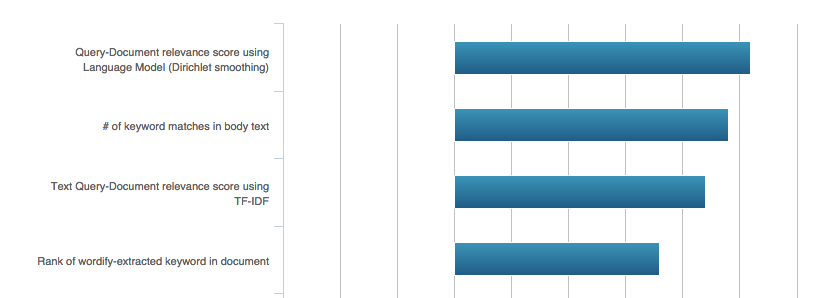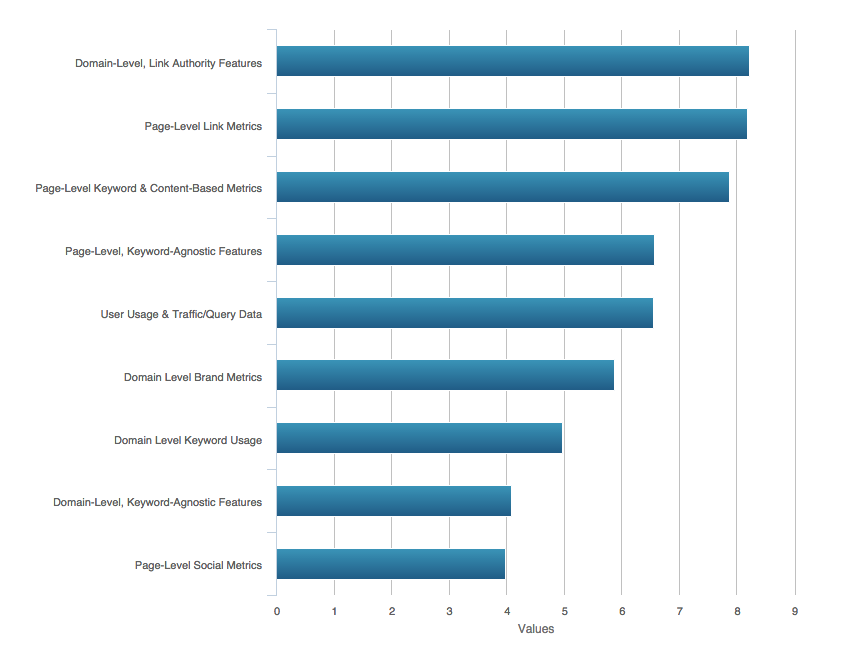Topics:
Search Engine OptimizationSubscribe now and get the latest podcast releases delivered straight to your inbox.
Need-to-Knows from the 2015 Moz Search Engine Ranking Factors Survey

Sep 9, 2015

 Every year, my heroes over at Moz spend a lot of time and resources putting together a massive survey that provides a detailed cross-section of search engine ranking factors.
Every year, my heroes over at Moz spend a lot of time and resources putting together a massive survey that provides a detailed cross-section of search engine ranking factors.
It takes every possible piece of search engine optimization into account, covering everything from domain-level attributes and the number of social shares, to the ratio of ads to content and smashes it all together in a way that is very easy to understand and digest.
With contributors from all across the interwebs (Moz itself, and dozens of other agencies and businesses) it truly is a vast, valuable resource that the budding online marketer can learn from.
What’s In the Moz Report?
There are two major parts of the report: Correlation Data and Survey Results.
Each was sourced differently and analyzed differently, but should be taken into account jointly. Let's dive in and see what the Moz team shared in each section.
Correlation Data
Correlation data is taken from an analysis of keywords in Google and puts website features and rankings in the spotlight.
If you’re familiar with statistical analysis, you know that correlation does not imply causation, but I’ll take it right from the source for this one:
“Remember: Correlation is not causation! Just because websites/pages with a given feature tend to rank higher doesn't necessarily mean that this particular feature is the cause of that higher ranking. That said, we can learn a lot from correlation studies!”
Here are a few of the key findings from the correlation study.
Page-Level Keyword Features (On-Page SEO)
Google may have changed SEO quite a bit in the past few years, but some significant things remain the same. For example, take on-page SEO. As it has been in the past, it is extremely important to make sure that all of your on-page elements are optimized around a desired keyword. This means having your keyword in your page title, headers, image alt tags, meta description, and content.

In this section, you’ll see a lot of strange acronyms in there. One I found particularly interesting was called LDA, or Latent Dirichlet Allocation. Unless you were a linguistics major, you might not know what that is, but as an Inbound Marketer, you just need to know that it means focusing on a topic.
LDA takes into account related or similar words when determining search engine ranking. For example, if your topic is cars and you decide to use “automobile” in your content rather than saying “car” repeatedly, it will not work against you. LDA recognizes “automobile” as a synonym and it will, in fact, help your rank.
To illustrate, if your title is “Ten Ways to Increase Conversion Rates” and your keyword is “increase conversion rates,” feel free to say you’ll “boost your conversions” or “improve conversions” as well, as they have similar meanings. With LDA, you may wander from your exact keyword as long as it consistently comes back to boosting the rate of conversions.
Overall, keep your content focused; Google loves that, and so do readers. You can learn a little more about it here.
Expert Survey
The expert survey results portion of the report is compiled from findings from 150 SEO professionals and what they think is most important to Google’s internal algorithm.
Since we’ll never see behind the curtain unless we work at Google, we’ll never know exactly what goes into the algorithm, but we can have a pretty good idea of what it prioritizes based on the search results that we all see.
Here’s some of what the report noted as the most significant contributors to your site rank and authority:

Domain- and Page-Level Links
Not surprisingly, backlinks were seen as the most valuable resource at the domain- and page-levels. This makes sense. If hundreds of links from different domains all point to your article, Google will recognize it as having more authority and it will climb higher on SERPs.
The content from linking domains and pages matters too. If a website with content focused on conversion rate optimization links to your article “Ten Ways to Increase Conversion Rates,” it will pass more value and authority to your page than one with a focus on another topic. This is the basis of the Skyscraper Technique, something you can do on your own to generate more links pointing to your site.
Page-Level Keyword and Content Metrics
Moz’s experts ranked page-level content as a close third. This is a big category and includes keywords and content in the HTML code of a web page. While I agree with Moz’s experts on the ranking of keywords and content, I would argue that this should be the focal point for any Inbound Marketer.
Creating persona focused content is the crux of what we do as Inbound Marketers and the source of our prowess. We count on our content to resonate with our website visitors and escort them through the buyer’s journey.
Page-Level Keyword-Agnostic Features
Ranked fourth in the expert survey was page-level keyword-agnostic features. This section was for page-level features that had nothing to do with content, such as:
- page load speed
- mobile friendliness, and
- uniqueness of content.
While content is the focus of a page, these features are just as important and mostly affect the user experience.
If the page loads slowly, it’s either difficult to read or is not SEO-friendly and can jeopardize the effectiveness of the content. This means making sure that Google’s crawlers are able to read the content, index it, and display it as search results (hopefully on the first page!)
At IMPACT, we use HubSpot’s Content Optimization System to make sure that our content and pages are SEO-friendly.
Key Takeaways
- Focus your content on a topic - the more focused it is, the better it will rank for that topics keyword
- Use your content to build authority - become a thought leader by actively using social media, reaching out to influencers, and generating backlinks
- Optimize your website for user experience - a content optimization system will make sure your website has the proper structure and features that search engines look for
While this survey’s results do not have a direct relationship with Google’s search engine algorithm, they provide valuable insights into the efficacy of techniques used by leading SEO experts from around the world.
If you want to check out the results for yourself, head on over to Moz.
Free: Assessment